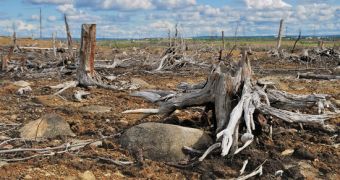High officials in Paraguay have recently agreed to extend the country's so-called Zero Deforestation Law to 2018. This law was enacted back in 2004, and it is intended to protect forested areas in the country's eastern regions.
It does so by making it illegal for people to clear these areas and turn them into agricultural lands, the World Wildlife Fund (WWF) tells us.
Conservationists explain that, until this law was enacted, Paraguay had the second-highest deforestation rate in the world. Once the law was rolled out, deforestation rates dropped by 90%.
However, the country must still be held accountable for the destruction of 7 million hectares of the Atlantic Forest, which covers parts of Paraguay, Brazil and Argentina.
Courtesy of the development of ranching and agriculture, this forest currently stretches over merely 7% of its original surface.
Whatever remains of it is home to an impressive number of plant and animal species, most of which risk going extinct in the not so distant future.
“The Atlantic Forest, located in Paraguay, Brazil, and Argentina, is one of the world's most endangered tropical rainforests, with just 7 percent of its original surface coverage remaining.”
“Despite the massive deforestation, fragmentation, habitat destruction and degradation of rivers, it contains nearly 7 percent of the world’s plant and animal species, many of which are endemic and threatened with extinction,” the WWF explains.
Now that Paraguay has agreed to extend its legal protection of these areas, conservationists are hopeful that these forested areas might still have a chance of being around for many years to come.
“Reducing emissions from deforestation and forest degradation through sustainable forest management in Paraguay is imperative not only to maintain one of the most threatened biomes on Earth, but also to reduce emissions and to preserve the livelihoods of forest-dependent communities, including many indigenous groups,” Lucy Aquino, the current director of WWF Paraguay wished to stress.

 14 DAY TRIAL //
14 DAY TRIAL //